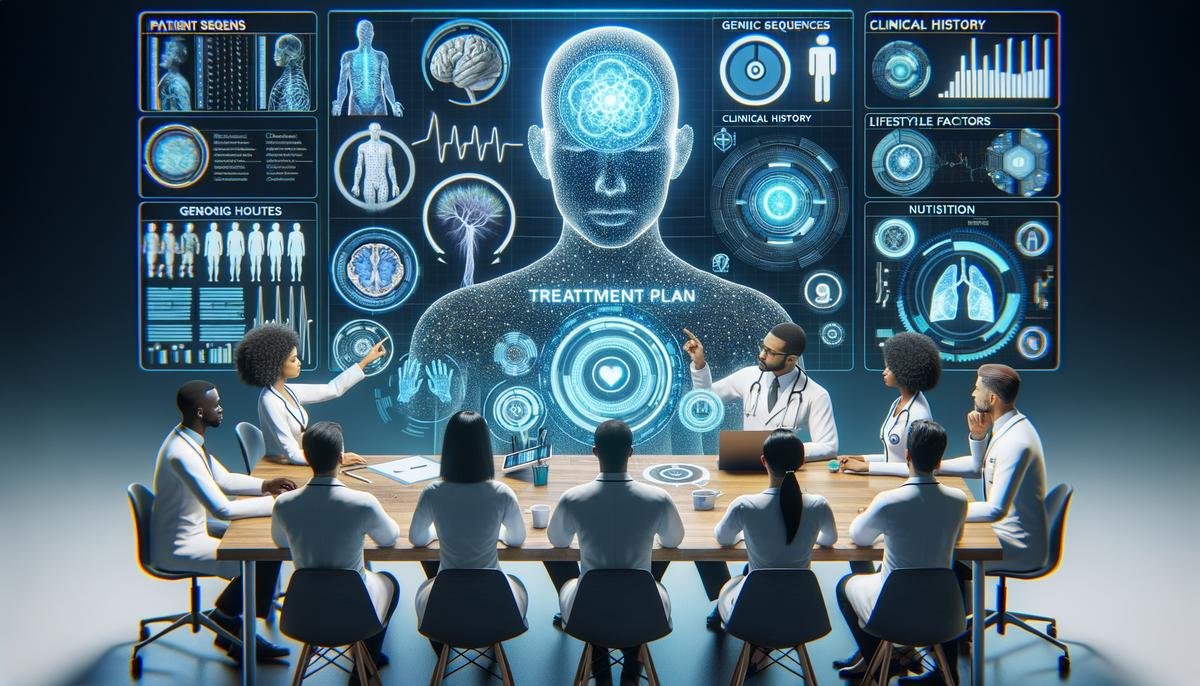Artificial Intelligence (AI) is reshaping healthcare, bringing advancements in patient care, early disease detection, drug discovery, and personalized treatment plans. By integrating AI into various aspects of healthcare, we are seeing improvements in efficiency, accuracy, and patient outcomes.
Streamlining Healthcare Workflows
AI is improving radiology efficiency. Algorithms help radiologists analyze medical images like X-rays and MRIs, highlighting critical areas needing attention. This ensures timely decisions and allows care teams to focus on urgent cases first.
AI also tackles administrative tasks. Automated systems handle routine data entry for electronic health records, reducing the workload for clinicians. This allows doctors to spend more time with patients. AI also streamlines insurance claims and prior authorizations.
Nurse staffing benefits from AI analytics. It streamlines scheduling, pairing team members who work well together and creating more balanced schedules. This can help decrease burnout and enhance patient care.
These AI integrations provide a more efficient experience, optimizing workflows and patient outcomes.

Early Disease Detection and Improved Patient Outcomes
AI is becoming valuable in early disease detection. AI systems analyze patient data to identify early indicators of conditions like chronic kidney disease (CKD) that healthcare providers might overlook. This allows for earlier intervention and potentially better outcomes.
Heart disease detection has also improved with AI. Algorithms analyze ECGs, imaging data, and patient histories to predict cardiac events. This allows for earlier preventive measures.
Predictive analytics aggregates data from various sources, including:
- Electronic health records
- Wearable devices
- Genomics
By identifying patterns within this data, AI can forecast disease trajectories and guide personalized treatment plans.
For example, in diabetes management, AI analyzes glucose monitoring data to suggest real-time dietary and insulin adjustments. This helps stabilize blood sugar levels and prevent complications.
The integration of AI in early detection enables more timely and effective decision-making, potentially improving patient outcomes and quality of life.

AI in Drug Discovery and Development
AI is accelerating drug discovery and development. It can analyze vast datasets to identify potential drug candidates more quickly than traditional methods.
For instance, Insilico Medicine used AI to discover a novel anti-fibrotic drug for idiopathic pulmonary fibrosis in just 30 months, significantly faster than the typical 10-15 year timeline.1
AI algorithms can predict how molecular entities will interact with biological targets, potentially increasing efficacy and reducing adverse effects. Machine learning models also help predict pharmacokinetic and pharmacodynamic properties, streamlining the preclinical phase.
In clinical trials, AI helps select suitable participants more likely to respond positively to treatments. This can lead to more focused trials with lower attrition rates.
AI also assists in drug repurposing, identifying new therapeutic uses for existing drugs. This was particularly useful during the COVID-19 pandemic, where AI models quickly identified potential antiviral candidates from existing pharmaceuticals.
These advancements are making drug discovery and development more efficient, potentially bringing new treatments to market faster.

AI in Personalized Treatment Plans
AI is enabling more personalized treatment plans by analyzing clinical and molecular data. This is particularly important for complex diseases like cancer, where tumors can present distinct genetic variations.
AI tools like Tempus integrate clinical data with genomic sequences, lifestyle information, and environmental factors. These systems can predict how specific cancers may respond to different treatments, offering individualized therapeutic strategies.
AI-driven platforms also monitor treatment responses, allowing for real-time adjustments to treatment regimens. This helps optimize dosages and combinations of therapies, potentially improving efficacy and reducing risks.
In pharmacogenomics, AI analyzes genetic markers to predict potential side effects and effective dosing. This can help customize drug prescriptions to minimize adverse reactions and maximize therapeutic benefits.
These applications of AI are moving healthcare towards more precise and personalized approaches, potentially improving patient outcomes.

Ethical Considerations and Potential Pitfalls
As AI advances in healthcare, addressing ethical considerations is crucial. Data privacy is a primary concern, as AI systems process sensitive patient information. Strong data protection measures are essential to maintain patient trust and comply with legal requirements.
Bias in AI algorithms is another significant issue. Algorithms trained on non-representative data can produce skewed results, potentially exacerbating healthcare disparities. Ensuring diverse data representation in AI model training is important for inclusive and effective healthcare.
Transparency and accountability in AI systems are also crucial. Guidelines should define the scope, limitations, and decision-making processes of AI algorithms. This helps clinicians and patients understand and trust these systems.
Organizations like the World Health Organization provide ethical AI guidance, emphasizing the importance of ethics and human rights in AI technology use.2
Addressing these challenges requires ongoing vigilance and adherence to ethical standards. A collaborative approach involving diverse stakeholders can help navigate these issues effectively, ensuring AI serves as a positive force in healthcare while respecting principles of fairness, privacy, and transparency.

AI’s integration into healthcare is transforming processes and treatments. It offers potential for earlier disease detection and more personalized care, which could lead to improved patient outcomes.
- Zhavoronkov A, Ivanenkov YA, Aliper A, et al. Deep learning enables rapid identification of potent DDR1 kinase inhibitors. Nat Biotechnol. 2019;37(9):1038-1040.
- World Health Organization. Ethics and governance of artificial intelligence for health: WHO guidance. Geneva: World Health Organization; 2021.




